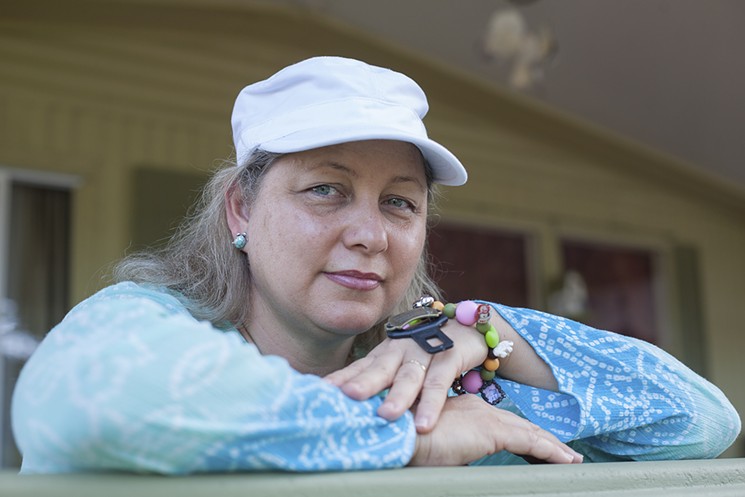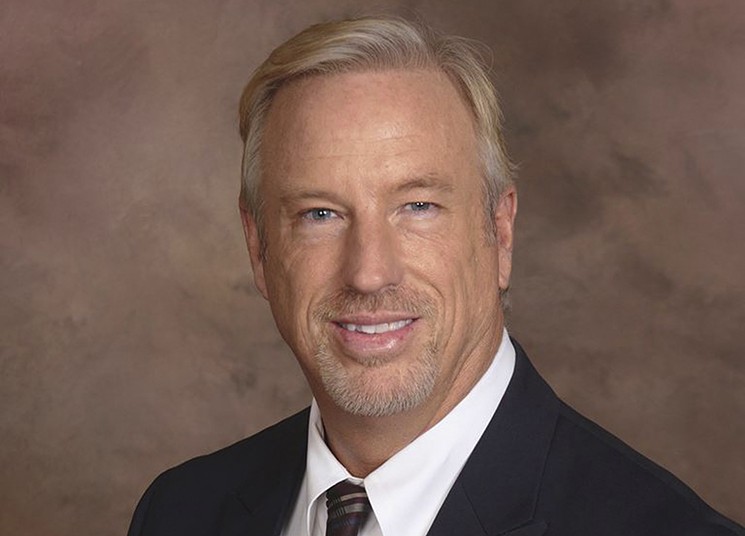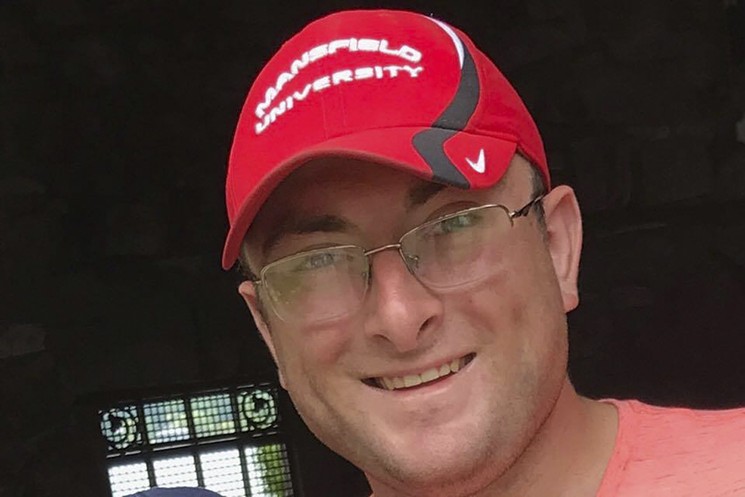Update: On November 7, 2018, Matthew Whitaker, a lawyer who sat on the board of World Patent Marketing, was appointed acting attorney general of the United States by President Donald Trump.
Ryan Masti could hardly believe what he was hearing. The soft-spoken college senior who'd grown up on a farm in a speck-size New York town listened breathlessly as a World Patent Marketing rep told him the company wanted to partner with him on his invention. In fact, the man told Masti, the CEO of the topnotch Miami Beach-based firm thought his idea could make millions.
The 24-year-old studying social work and completing an unpaid internship at a nonprofit suddenly saw flashes of his life as a millionaire: private jets, philanthropy, fame. But it wasn't just the money he was thinking about. His idea — a social networking app for people with disabilities — could really make a difference. Masti would know. His own ADHD and dyslexia had made him a target for bullies all his life.
While the patent and invention marketing firm's manufacturing director, Jerry Shapiro, gushed about all the lives they could change, Masti couldn't control his emotions. Tears flooded his eyes.
It was February 2016, and Masti had already wired World Patent Marketing $4,000 his late grandfather had left him plus $19,000 from a high-interest loan. Now, Shapiro explained, Masti would have to spend more to develop and launch the app. He had nothing more to give. But convinced by Shapiro's overtures, Masti's dad withdrew $50,000 from his 401(k).
And then: nothing. Every Monday for a year, Masti emailed to check on the app's progress, and every time, company officials responded they were still working on it. In March, they stopped replying altogether. Finally, Masti began Googling for answers and stumbled across a news release from the Federal Trade Commission.
Masti's heart went into free fall: World Patent Marketing had just been shut down by a Miami federal judge. It was, the FTC said, a huge scam.
"I was like, Oh my God," Masti recalls. "My dreams have just fallen through."
Thousands of would-be inventors like Masti were ripped off in the scheme, the feds allege. Padded, posterior-enhancing jeans; fruit crossbred with marijuana; a urinal shield to catch splatter — each one was sure to be a best seller, the company promised inventors, if they just paid for the firm's expertise in bringing ideas to market.
"I was like, Oh my God," Masti recalls. "My dreams have just fallen through."
tweet this
In reality, the firm's illustrious board — which included big names such as time-travel scientist Ronald Mallett and Florida International University professor Aileen Marti— simply took cash without ever meeting or reviewing any pitches. Some of the supposed innovations the company green-lit already existed, so patent applications were regularly denied. And despite the many "success stories" featured on its website, virtually none of the firm's clients ever made money.
As millions poured in, the firm's tough-talking CEO, Scott J. Cooper, boasted about trips to remote islands on his yacht and lashed out in expletive-laden tirades at inventors who complained. In screeds posted online and emailed to customers, the company bragged about its security team composed of ex-Israeli special forces trained in Krav Maga and threatened critics with lawsuits — or worse.
Neither Cooper nor his attorney, Daniel Rashbaum, responded to multiple interview requests for this story. In court, they've argued that World Patent Marketing is a legitimate operation that gave inventors multiple warnings about the enormous odds against them. "Ninety-nine percent of inventions fail to become commercially successful, which... is why there are bound to be disgruntled WPM customers no matter the quality of the services," Michael Pineiro, an attorney at Rashbaum's firm, wrote in one filing.
But experts say World Patent Marketing is simply the latest iteration of a long-running con in a barely regulated industry that targets starry-eyed inventors. As Cooper took victims for up to $400,000 each, they say, he also might have scared away a whole generation of inventors.
"What happens is you get an inventor who has a good invention and goes through one of these scammers and loses all their money, and they don't invent again," says John Calvert, executive director of the United Inventors Association. "Who knows what that person would have invented in the future?"
In late 2013, a South Florida man named Juan Rivera sat down with Cooper for a job interview at a company Cooper was launching, Zoom Auto Auctions. Cooper, though, seemed oddly preoccupied with Rivera's last job at a Miami firm called Patent Services USA.
"He was very in-depth with questions about the past business," Rivera would later testify in a lawsuit. "He was very clear, he had no idea the industry even existed."
Just a few months after that interview, Cooper contacted Rivera with an idea: Instead of opening the auto auction company, he wanted to start his own version of Patent Services USA. Rivera would get a 40 percent stake if he would reveal exactly how his former employer operated, violating a confidentiality agreement he'd signed. Rivera agreed, and in February 2014, World Patent Marketing opened its doors.
According to federal authorities, Cooper's new company was actually just the latest in a long-running con dating at least to the 1960s. The scam is virtually the same every time: In late-night TV commercials and Popular Mechanics ads — and more recently, sponsored Google listings — the businesses claim they have the expertise to develop inventors' ideas, get them on store shelves, and monetize them through licensing deals.
But in reality, the companies make millions off creators who rarely see a dime. The FTC has gone after scores of invention promotion firms for deceiving customers, but attempts to better regulate them have routinely failed to gain political traction.
The scam's earliest purveyors may have been a former patent examiner named Raymond Lee and a former partner, Lawrence Peska, who set up competing companies in the mid-'70s and raked in 35,000 clients and millions in profit. "Of those 35,000 clients, the invention developers admit, only 10 have ever profited from their inventions," the New York Times reported in 1977. "That doesn't sound like much of a success story."
The companies were dogged by lawsuits and the FTC before settling with the feds and shutting down a few years later. The shady industry they pioneered, though, remained alive and well. In 1994, a U.S. Senate subcommittee headed by Joe Lieberman heard from a salesman who testified his company had approved ideas as absurd as a wingnut that would bolt a gas pedal down. His office jokingly labeled the invention "Suicide Cruise," not realizing a TV reporter working on an exposé had submitted it.
In other words, Cooper promised, he could make an aspiring inventor's dreams reality.
tweet this
Lieberman introduced a bill giving the U.S. Patent and Trademark Office power to suspend or bar scam companies, but it failed. And the scams kept coming. In 1997, the FTC snared five at once through a sting called "Project Mousetrap," estimating the firms had bilked consumers out of more than $90 million. On the whole, the industry was making $300 million a year.
Congress tried to help with a 1999 law called the American Inventors Protection Act, which requires invention promotion firms to disclose success rates and the Patent Office to publish complaints. But it's easy to get around the rules. "Companies change their name every few years, or they move from one state to another state just across a river," Calvert says.
In the long history of invention scammers, though, experts say few exceeded Cooper at wringing so much money out of individual victims. With a unique combination of New York bluster and salesmanship — and a fighter's willingness to scrap with naysayers — Cooper charmed hopefuls into sending thousands of dollars before scaring away anyone who thought about blowing the whistle, burned inventors say.
The son of a leasing and finance group president, Cooper enrolled in 1994 at New York University to major in business. But a year later, the college says, he dropped out. Cooper would later tell customers his mom was "kind of embarrassed about it." After working as a branch manager at a New York bank, he founded Old Merchants Mortgage Bankers in 2002 with headquarters in Lake Success, New York, and locations in several states, offering mortgages to customers with bad credit. In 2006, the firm claimed to be one of the nation's fastest growing, boasting of loan applications worth $1 billion.
By 2008, though, he had shut down the company. Cooper later claimed he made $20 million. Soon he opened a Houston-based company called Renu Ventures, where he claims to have managed more than $60 million in private family investments.
Cooper left that company in 2010 and incorporated a new business, Desa Industries Inc., headquartered on Park Avenue. Desa became the parent company of World Patent Marketing in February 2014, when Cooper incorporated it in Florida.
Around the same time, he and his wife sold their stately, $1 million waterfront house in Atlantic Beach, New York, and moved with their children into another million-dollar home, a condo in one of the two iconic, diamond-topped buildings on Collins Avenue in Miami Beach.
Shortly after Cooper persuaded Rivera to hand over Patent Services USA's business model, World Patent Marketing opened on the sixth floor of 1680 Meridian Ave., an office building steps from Lincoln Road Mall. While Cooper hired staffers off Craigslist and packed them into rows of cubicles, he moved into a large office where he arranged four computer monitors on his desk and blown-up photographs of a yacht and the flag of Israel on the shelves behind it. By late 2014, the company boasted it was "a leading patent authority worldwide."
The business' appeal to inventors was simple and powerful: It could take any idea off a cocktail napkin and get it onto store shelves.
In other words, Cooper promised, he could make an aspiring inventor's dreams reality.

The idea leapt into Brenda Wilcox's mind so suddenly, so clearly, she was sure it came from above. After hearing a report about a baby who died after being forgotten in a car's backseat, the Dania Beach stay-at-home mom decided there had to be a simple solution.
Just like that, she had it: the Bring Baby Bracelet, with an attachment to a car seat buckle as a reminder when a child was in the back. "I felt like it was so powerful that it was an idea I was being trusted with," Wilcox says.
After building a prototype, she found World Patent Marketing and dialed the number. Soon she was taking out a loan and wiring the company $13,000.
For at least three years, Cooper's pitch worked like magic on dreamers like Wilcox: Millions of dollars flowed from thousands of inventors, and influential people jumped to be on the board as Cooper hobnobbed with powerful politicians and shared photos of his yacht. If there were hints of problems, he scared them away.
Most inventors found the company through its website, which listed retailers such as Target and Toys "R" Us as places where its customers' inventions were sold and posted bios of prominent board members such as former U.S. Attorney Matthew G. Whitaker and world karate champion Moti Horenstein.
Of course, would-be customers didn't know that Cooper attracted those board members through promises of a sort of quid pro quo. He gave Whitaker's 2014 Senate campaign a $2,600 donation and paid him nearly $10,000, World Patent Marketing records show. Mallett was promised funding for his time-travel research and paid $5,000. Mast, the U.S. representative, received a campaign contribution of $5,600, but no direct compensation. Most board members were paid between $5,000 and $12,500 annually.
In exchange, Cooper's salespeople heavily touted the board and promised they personally reviewed ideas. The company also invoked success stories, like Teddy's Ballie Bumpers — inflatable tubes that block toys from rolling under couches. Its California inventor, Steven Harris, said he saw sales skyrocket after World Patent Marketing helped him land a manufacturing deal. "It's the American dream," Harris boasted in one ad.
Sales reps were given fancy titles like "project manager" and exuded enthusiasm on the phone. Masti was touched when one said her best friend's autistic daughter had cried over his concept of a social media app. Another salesperson told Wilcox he too was a person of faith. "I started out on a big note of trust with them," Wilcox says.
First, salespeople would peddle a $995-to-$1,295 "Global Invention Royalty Analysis," or GIRA, containing research prepared by an "Ivy League research team" that scored an invention's likelihood of market success on a scale of 0 to 100. Customers who took the bait received a glossy, 70-page booklet in the mail.
Penn Mason, a Nashville real-estate agent with a slight Southern drawl, scanned the pages in the summer of 2015 and was thrilled to see that his idea for an app connecting homebuyers to agents had been given 80 points. "They basically told me that mine was at the top of the files for Scott Cooper to review since it went through this study and it came back so good," he says.
Next, salespeople pitched patent protection and invention promotion packages with price tags between $7,995 and $64,995. Then came phase three: a "licensing" or partnership deal priced anywhere from $50,000 to $400,000.
At the heart of all the pitches, though, was Cooper himself. On his blog, he bragged of 16-hour days full of meetings with important people, always with a bodyguard at his side. His office was accessible only through several locked doors to keep out all the riffraff.
"Scott went out of his way to make himself a celebrity within the company," says Cattya Bella, who became a vice president of the firm before leaving in 2015. "People were pouring in trying to talk to him."
Cooper posted photos of his Bentley and boasted about his yachting trips to the Bahamas.
tweet this
Cooper was a thousand-miles-a-minute guy who spoke with a heavy New York accent. He'd jump to a different subject midsentence, sometimes explaining he had ADHD. He was a "complete anxiety-filled, energetic scatterbrain," says Matt Svedahl, a Minneapolis contractor who paid Cooper $160,000 to work with his idea for smokeless chewing tobacco. As soon as Cooper had an idea in his head, Bella says, he ran with it, sometimes calling at 2 in the morning. He commanded a high level of respect in his office — even if he often walked around in shorts and Adidas slides.
"He was always like a genius to me," says Bella, who insists he was genuine in his dream to make his company a go-to source for inventors. "You know how they say Einstein is crazy because he's like a genius? That's how I feel about Scott."
In emails with customers and employees, though, he could also be terse, "almost to the point of being rude," as one entry in the company blog put it. He could also be vulgar. Masti recalls Cooper asking him whether he wanted to sleep with Miss Rhode Island Kelsey Swanson, an advisory board member. Cooper then bragged he'd have to "wait in line," Masti says. "I'm a religious person, so I kind of took offense to that," Masti says.
And Cooper loved talking up his wealth. By late 2015, he had owned three million-dollar condos in Miami Beach. In 2016, after divorcing his wife, he sold the units and upgraded to a $3 million, seven-bedroom, seven-and-a-half-bathroom Mediterranean-style manse on a canal in Mid-Beach. When he later proposed to a downtown spa manager-turned-World Patent Marketing Chief Operating Officer Esti Prager, he presented her with a massive rock.
Cooper spent with abandon, posting photos online of his Bentley and boasting about his yachting trips to the Bahamas. In 2016, as he promoted a customer's line of Sasquatch dolls, he offered a $1 million reward for proof of the mythical creature's existence. "Can you imagine the instant popularity of the brand if Bigfoot evidence is actually obtained?" he wrote. "It would be the best million I ever spent."
His customers, though, were still waiting for their own paydays — and often talking themselves into believing their dreams were still possible.
Wilcox demanded a face-to-face meeting with Cooper. Mason, who'd borrowed from his husband's savings, called the Patent Office to double-check that his application had been filed. Svedahl, who had asked over and over again for photos of his supposedly manufactured product, reassured himself that his invention was too promising for Cooper to abandon.
"You're calling them and you're talking to them and you start to kind of have doubts," Svedahl says. "But you still want to believe in what they're doing."

It wasn't yet 4 a.m. when Christopher Seaver opened his email and began typing a lengthy plea to Cooper. Frustration was gnawing at the Pembroke Pines surgeon. It was time to say something.
"Please tell me that after giving you a small fortune why you keep putting me off?" the doctor wrote. "Literally everybody I talk to tells me I'm being scammed."
The date was January 31, 2017, and over the past two years, Seaver had depleted his life savings, borrowed from his mom and against his house, and taken out unsecured credit lines, all so World Patent Marketing would bring to life his idea for a cell-phone case with netting on the back to hold keys and headphones. As Seaver handed over $300,000, Cooper drew up complicated Excel spreadsheets supposedly proving Seaver would make at least $1.4 million. After long delays, Cooper now insisted the product was on the market. But Seaver couldn't find any proof that it was actually for sale — or that it even existed.
Cooper's response landed in Seaver's inbox about an hour later: "Your [sic] really fucking crazy — it's 5 am — call my cell whenever today."
By early 2017, Seaver was far from alone in his fears. Hundreds of customers were questioning whether the company had swindled them. Sales reps disappeared, promised media coverage ended up being short press releases, and applications were rejected by the Patent Office after Cooper's company abandoned them. Precious few products seemed to actually be for sale.
When Cooper's downfall finally came less than two months after Seaver's email, it was swift and stunning — and left up to $24 million unaccounted for, hundreds of victims scrambling, and high-profile board members rushing to distance themselves.
"He was surrounded by... all ex-Israeli Special Ops and trained in Krav Maga."
tweet this
For years, Cooper had been able to fend off problems with threats. In one blog posted in October 2015, a company rep wrote that Cooper had been forced to hire a security team of former Israeli commandos after an ex-employee threatened to post negative reviews online. An embedded photo showed one of the team members aiming a machine gun. "The time has come to hit back," Cooper said.
In another entry, published in September 2016, Cooper detailed how an "unhinged inventor" tried to "break in" to the Meridian Avenue headquarters, which were protected by biometric scanners, security cameras, and guards, to submit an idea directly to Cooper. "He didn't make it past the front desk before the building was on lockdown and he was surrounded by the intimidating security team, all ex-Israeli Special Ops and trained in Krav Maga, one of the most deadly of the martial arts," the blog boasted. "[They're the] kind of guys who are trained to knockout first and ask questions later."
The message was clear: Mess with us and you'll have hell to pay.
Sure enough, negative reviews on social media would trigger an explosive response from Cooper's team, which regularly insisted critics could be punished with 15 years' imprisonment for extortion. On at least one occasion, that threat came from Whitaker, the board member who was once a U.S. attorney in Iowa. In an August 2015 email responding to a critic, he mentioned that background and claimed that filing a complaint with the Better Business Bureau and "smearing" the company online could result in "serious civil and criminal consequences." Then came the critic's response: "I am a former United States attorney... You are a party too [sic] a scam."
The CEO also regularly lashed out. In an email to an irate customer, a Phoenix woman named Crystal Carlson, Cooper threw around the weight of his board members. "Do you think all these powerful and influential people would join forces with me if what you said were true?" he asked in the April 2016 email. "We have former US Attorneys, members of President Obama's advisory council, military generals, famous doctors. Think about it."
When a man named Andrew Bookbinder emailed Florida International University researcher and World Patent Marketing board member Aileen Marty in July 2016 about his suspicioms, she forwarded it to Cooper, who responded instead. "That is probably going to be the most expensive email you ever sent," he wrote, cc'ing his attorneys. At the bottom, he listed what he believed to be Bookbinder's place of employment, plus a headshot of him.
He couldn't keep trouble at bay forever, though.
After Cooper's email threats, Carlson decided to dig into whether other inventors had been scammed. Though the company typically used only inventors' first names and last initials in promotion materials, she tracked down dozens on Facebook and found out they'd also wasted thousands with no return.
Carlson quickly connected with a truly unlikely critic: the star of one of the company's biggest success stories.
Turns out Harris never received a patent for Teddy's Ballie Bumpers or saw sales skyrocket, as the company had claimed. Instead, he found out that the Patent Office had rejected his application. His licensing and manufacturing deal was off. Harris would sell only 15 bumpers, while thousands of others sat in a warehouse.
Carlson began organizing victims and soon found a lawyer. In December, more than 100 former customers filed a class-action lawsuit against World Patent Marketing in the Southern District of New York, alleging deception, fraud, and violations of the American Inventors Protection Act's disclosure rules.
In court, Cooper's firm claimed it wasn't bound by the American Inventors Protection Act because it directly sold inventions. His attorney also accused customers of blaming the company "for the failure of their business ideas."
But the floodgates had opened. Negative comments began pouring in online. And things were about to get worse.
This past January, a new customer pitched a recipe. As usual, a salesperson gushed that the inventor "had a great idea with lasting power" and "should expect a revenue stream for decades" even though recipes are almost impossible to patent. The would-be customer, in fact, was an undercover FTC investigator.
In March, the commission filed a civil complaint in the Southern District of Florida alleging deception and unfairness. World Patent Marketing, prosecutors wrote, had strung along its customers only to leave them with nothing. "Indeed," they continued, "many of Defendants' customers end up in debt, or losing their life savings or inheritances."
A federal judge quickly granted a restraining order, effectively closing the company. As Cooper's firm went into a receivership, federal agents searched the office March 8 and found damning evidence, such as scripts for salespeople instructing them to tell all aspiring inventors their ideas were likely to be successful. There was no rejection script. In fact, the FTC wrote in one court filing, "employees were told to reject an idea only when the sales agent thinks it might be an undercover call from a federal agency."
The search also discovered hundreds of the booklets supposedly prepared by Ivy League experts. They were actually written by a lone grad student at Harvard and contained mostly boilerplate information, some of it apparently lifted off the internet. The booklets virtually always scored inventions highly.
The company's patent applications weren't drafted by patent attorneys, the U.S. Patent and Trademark Office revealed in disciplining at least two attorneys the company had contracted. They were predrafted by World Patent Marketing and provided to attorneys to file. One of the attorneys, Philip T. Virga of California, admitted to never questioning whether they were appropriate for their inventions, never communicating with inventors, and never responding to communication from the Patent Office. As a result, the Patent Office considered many of the applications abandoned and closed them.
In fact, the FTC says, World Patent Marketing sold only one product on Amazon: the Safety Blade. And the patent application of the original inventor was abandoned. Soon after, Cooper submitted a patent application for a similar product, the Safety Razor Scraper System, in his own name.
When the feds closed in, Cooper's big-name advisory board members scattered — none more quickly than Republican U.S. Rep. Brian Mast (whose district runs from Palm Beach to Fort Pierce). On March 16, he told Politico he didn't even know he was a board member until someone sent him a news release about it. Despite photos of him and Cooper at parties together, the freshman lawmaker insisted they'd met only briefly. Soon after, he announced he was returning Cooper's $5,600 donation. (After publication, Mast added that he was cooperating with authorities.)
Cooper fought back. During an April hearing in downtown Miami on the FTC lawsuit, lawyers for World Patent Marketing argued the company was legitimate and provided real services to customers. They claimed Cooper was shifting to a new model because big-box retailers were hard to sell on new inventions. His plan was to sell products directly through his website. The attorneys also said Cooper was passionate about the company and didn't profit off it.
Cooper fought back. During an April hearing in downtown Miami on the FTC lawsuit, lawyers for World Patent Marketing argued the company was legitimate and provided real services to customers. They claimed Cooper was shifting to a new model because big-box retailers were hard to sell on new inventions. His plan was to sell products directly through his website. The attorneys also said Cooper was passionate about the company and didn't profit off it.
"Mr. Cooper... should be entitled to run a business where they assist those people that do want to take on the long odds of taking an invention, an idea, and trying to enter the marketplace," attorney Michael Anthony Pineiro told federal Judge Darrin P. Gayles.
But Gayles also heard strong words from former customers. Later in the hearing, Seaver, Masti, and Harris each took the stand. Harris was especially eager to tell his story, flying from North Carolina to Miami and showing up at the downtown courthouse despite having undergone double hernia surgery five days earlier. He'd been having trouble sleeping after hearing everyone's stories about the money they'd lost. He seemed to feel a kind of responsibility.
"It's very sad to know that people invested because they thought that my story was a success story, when in truth it just never existed," Harris said. "It was all a lie. It was a big lie."
The metal gate to the sprawling Mediterranean-style home hangs open on its hinges, revealing a white luxury SUV and an empty front yard. Once covered with crawling ivy, the house is now barren, with stickers covering some of its windows. Cooper's manse looks almost abandoned on a balmy August afternoon.
But a woman's voice answers a knock. Without opening the door, she asks who it is through a crack splitting the wood. Her words are firm when she realizes it's a reporter.
"You will be escorted off our property," she says, still speaking through the door. "I will be calling the police."
Five months after the FTC pulled the rug out from under World Patent Marketing, the company remains shuttered, its assets frozen, and its CEO silent in his waterside mansion. Jilted customers scored one victory this past August 16, when — over objections from Cooper's attorneys — Gayles ordered that the injunction remain in place.
But World Patent Marketing's former customers could face a long wait for any kind of compensation. The FTC says its receiver has located only $2 million of the $26 million allegedly bilked from would-be inventors. The feds started out with about 18 victims but say they have heard from dozens of others as people realize they've been duped.
In the wake of the explosive allegations against World Patent Marketing, some observers say tighter regulation of the scam-prone invention promotion industry is needed. Carlson, the Phoenix inventor who launched the class-action lawsuit, suggested the companies be required to register with the Patent Office — the exact proposal made in Congress nearly 20 years ago. "I mean, these companies are still out there," she says.
"You will be escorted off our property. I will be calling the police."
tweet this
Gene Quinn, a patent attorney who for years chronicled invention-promotion scams on his blog IPWatchdog.com, says he has been surprised the government hasn't done more after the large amount of money the fraud has cost people. And Cooper's company, he says, takes the swindle to a "whole new level": Typically, invention scams bilk about $10,000 to $20,000 from individual victims — nowhere near the $400,000 some of Cooper's clients lost.
"We're talking many orders of magnitude difference here," Quinn says. "It sounds to me like this could be an American Greed story for CNBC."
Cooper still insists he did nothing wrong, though. In court, his attorneys say he was upfront with inventors about the odds stacked against them, pointing to a blog post he wrote about most inventions failing and a similar statement published on the website. They even asked Judge Gayles to sanction the FTC for failing to include that information in court filings. As for exaggerated claims made by salespeople, his lawyers argue the business was entitled to "a little puffery."
Bella, the former employee, insists Cooper had dreams of making his company "the biggest thing in patent history" and wanted to be the smartest person in the industry. "I would feel like I was scammed too because I'd be like, 'I spent all this money and nothing happened,'" she says. "But there's no guarantees in any of this shit."
However, Gayles hasn't bought those arguments. On August 16, the judge wrote that Cooper's company "made a series of misrepresentations to consumers — many of which defendants concede were false." Those misrepresentations "were not mere puffery."
The consequences of the bust could be far-reaching: Two patent attorneys have already been disciplined by the Patent Office for rules violations. One of them, Marina Mikhailova, is suspended from representing clients before the office for 20 months; Virga, the other, is suspended for five years. And several former clients say they've been contacted by the FBI.
But one group that benefitted from the alleged fraud — the board members who lent their names to the firm — hasn't seen any blowback yet. The board members reached by New Times said they did not know the company might not be legitimate. Marty, the FIU researcher, says that when she was never asked to review any patents, she just assumed nothing in her area of expertise had been submitted. "I was busy with my life, you know? This isn't something that I was focused on," she says.
Time-travel researcher Mallett says much the same: "I was hoping to get money for my research. I didn't get any money, I was disappointed, and I resigned."
For victims, a Facebook support group allows them to commiserate and compare notes. Many are still repaying huge loans they took out to fund their ideas. Seaver says he's both personally and financially devastated.
Masti didn't give up on his idea. He recently paid a guy he found online $500 to build the app, Socially Accepted. Earlier this month, it finally went live on the Google Play Store.
But Masti is also stuck living at his parents' house, trying desperately to find a job to pay off his debt. After spending $73,000, he recently found out his patent hadn't even been approved.
"Most people in my area that I went to school with, they have a house," the now-25-year-old says. "They're settling down, and I spent all my money on an idea."
Clarification: This story has been updated to make clear that U.S. Rep. Brian Mast did not receive any direct compensation for his alleged role on the WPM board, though he acknowledges accepting a large campaign contribution, which he says he has returned.













